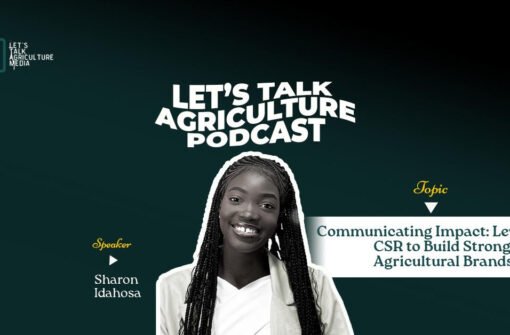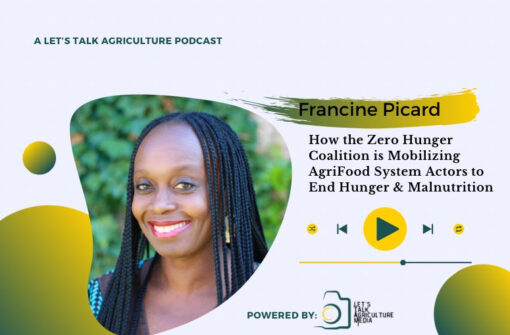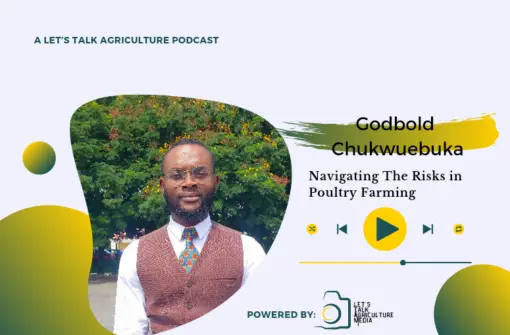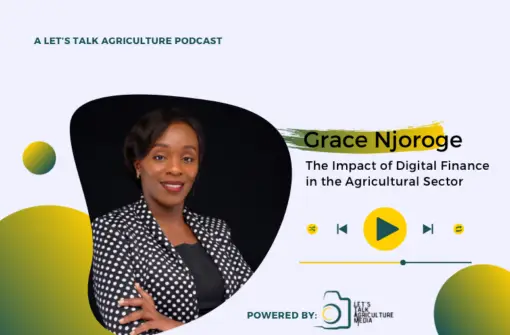How The Zero Hunger Coalition is Mobilizing Agri-food System Actors to End Hunger and Malnutrition.
Intro
[00:00:42] Sharon Idahosa: Hello, beautiful people. Welcome to the Let’s Talk Agriculture podcast the podcast that connects you with the happenings, the trends, and opportunities in the agriculture sector.
[00:00:52] Sharon Idahosa: So, here’s a quick information for us. We will be rounding up the Let’s Talk Agriculture podcast show for the year in [00:01:00] October and maybe stretch to November. Because we are trying to prepare for our year end vaccine, and if you’d like to be a part of it, please do well to reach out to us. Send an email to hello@letstalkagriculture.com.
[00:01:12] Sharon Idahosa: Now for today’s episode, we will be looking at how the Zero Hunger Coalition is mobilizing Agri food systems actors to end hunger and malnutrition. Now, zero hunger is part of the SDGs and it must be addressed. So to help us learn more about the Unifying Effort, join me in welcoming Francine Picard, Director of Partnerships at Shamba Centre for Food and Climate.
[00:01:39] Sharon Idahosa: Hello, Francine. Thank you so much for joining the show today. I hope you’ve been well.
[00:01:42] Francine: I’m fine, Sharon, and thank you for having me today.
[00:01:45] Sharon Idahosa: It’s a pleasure to have you here. When I saw your profile, I just thought, yeah, maybe we could connect. I, to be honest, I wasn’t looking at the Let’s Talk Agriculture podcast.
[00:01:54] Sharon Idahosa: I was trying to be very biased because I have A podcast for women. And I thought that, yes, maybe I [00:02:00] should have you on my personal podcast, but at the end of the day, we found ourselves here, which I think is amazing. So, thank you once again for joining LTA podcast. So, to get this episode started, maybe you can just give us an overview of what the Zero Hunger Coalition is all about.
[00:02:17] Sharon Idahosa: What is the inspiration behind this and why now?
[00:02:21] Francine: Thank you, Sharon. Before I start talking about the Zero Hunger Coalition, I just want to reflect on You Wanted Me as a Woman, and I think that the Shamba Centre, the organization that I’m one of the co-founders, actually has an amazing story, because it’s all about three amazing women.
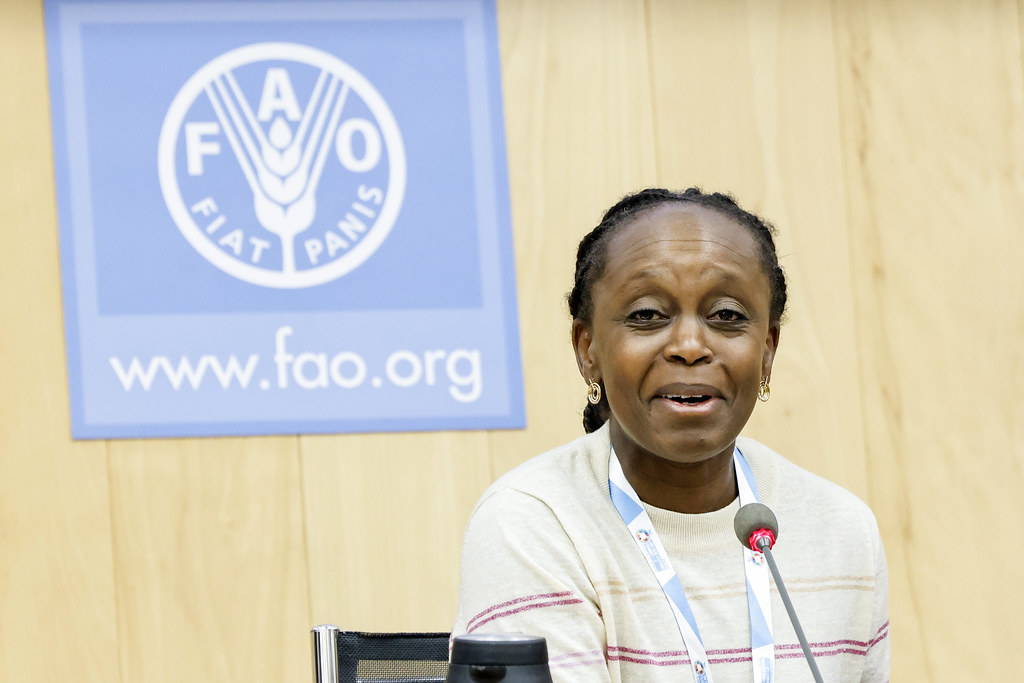
[00:02:38] Francine: Sometimes it’s also nice to recognize who we are, uh, that’s joined forces all together to say, okay, let’s work on, we have been working on the issue of ending anger, but let’s put our forces all together to see, to then try and change things the way that we want to change it. Let disrupt the system the way you [00:03:00] think we are able to achieve it.
[00:03:01] Francine: So the Shamba Center is a new organization. We have two years of existence and then we are drafted by the passion and some of the passion actually is quite huge because it’s all about How we can ensure that we are bringing idea, bold idea, and, and how we can move with all our idea to change things. So one of the initiatives that we thought could also respond to that quest is the Zero Hunger Coalition.
[00:03:29] Francine: So the Zero Hunger Coalition actually has been, uh, created, uh, as a response to the urgent global needs to address hunger and malnutrition. As you know, we are facing a huge amount of people. People now more than 700 are going to bed hungry. And this is really outrageous, is not acceptable. But this is also the reality.
[00:03:50] Francine: And I think that’s, uh, the whole world gather together in 2021 during the work. UN, United Nations Food Systems Summit and say, what can we do together to actually ensure that the issue of malnutrition and hunger is not only about producing more food, is also for ourselves as an individual, as an institution, to see if we can, uh, Look that in a holistic way.
[00:04:17] Francine: We need to define the way that we are consuming the way that you are producing the way that our relationship to the food needs to be looked at differently in a very holistic manner in order to change things. So, the Zero Hunger Coalition came in that conversation and say, yes, but we need to ensure that hunger.
[00:04:38] Francine: need to disappear because the world is, is a plenty. We have enough resources. We have enough food, but we are not able to target that simple issue that actually somehow, I need to admit some, maybe we as a human were some selfish, uh, but we need to change that, that, that sound. [00:05:00] Um, so the, the coalition emerged as I say, uh, three years ago, it brings together government, private company, civil society, UN organization, because we need to walk towards the same goal.
[00:05:14] Francine: And I think it’s all about finding long term solution and not just quick fixes as we used to do. I think we need to find a way that we can create a platform that actually leverage that willingness to change things and also to eradicate anger.
[00:05:33] Sharon Idahosa: Thank you so much for that overview. I mean, I know how, how important it is for us to come together to achieve certain objectives.
[00:05:44] Sharon Idahosa: And I think it’s really amazing to know that this is an initiative led by women, just yesterday when I had a conversation with. An amazing woman on the history podcast. I, we, we, uh, we mentioned or rather we identified that [00:06:00] when women decide to take up a position, I mean, it just, she just easily transforms that’s full initiative and I’m very, very sure that you together with your team, you’re doing amazingly well, because I feel that when women decide to put their hands in something, they do the extra now to make it work.
[00:06:21] Sharon Idahosa: And I’m very, very sure that this initiative would help bring partners together and, and help us to solve that common goal, ending putting a stop to hunger and malnutrition. So, thank you very much for this initiative. Thank you so much for working together with your team to draw together partners to solve an issue like this.
[00:06:43] Sharon Idahosa: I can tell you that, yes, in Nigeria, we’re definitely seeing that a lot. Somehow, I feel like the COVID 19 was a lot more better compared to now. I’m just wondering how really because we were meant to stay at home and the rest [00:07:00] and we weren’t going out much activities. Um, wasn’t going on. But then again, now things are A lot more difficult compared to how it was before.
[00:07:09] Sharon Idahosa: And I think this is an urgent, um, situation, meaning that we have to call on stakeholders to come together, look out for the way forward. So, I, again, I want to appreciate you for the work that you’re doing to get stakeholders together to address this, um, Major challenge that we face currently. Thank you so much.
[00:07:32] Sharon Idahosa: Yes. Yes. All right. So, um, how does the Zero Hunger coalition bring together various food actors to work towards, uh, ending hunger. Maybe you can share some examples of different actors that are collaborating through this coalition.
[00:07:48] Francine: Yes. And I think what we have been able to achieve, and I think this is one of the success with several coalition is to bring.
[00:07:57] Francine: People together, those people that are working the [00:08:00] talk, um, saying that one of the chairs of the zero coalition actually is Dr. Miyake. And I think for those who actually, because we’re in the African continent, everybody know that Dr. Miyake has been, uh, for many years, uh, the, um, Uh, the head of NEPAD, AU NEPAD, um, and he has also been the former prime minister in Nigeria.
[00:08:25] Francine: But, I mean, he is someone that has been committed to see that, uh, one of the potentials of Africa is agriculture. Uh, he is one of the persons that, uh, Is beyond the cadet. So, for us to have Dr. Miyake has really put some energy on the Zero Hunger Coalition. Um, because he’s someone that is really committed, someone that is really foreseeing that if we pull all our forces together, we can still, we can, uh, make the change, the change that we are needed.
[00:08:58] Francine: Um, [00:09:00] so, uh, what we have been able to, to encourage is really to put together, uh, an advisory board that is really working with Dr. Miyake to see, to see the Zero Hunger Coalition moving. And part of that are, um, members of the FAO, uh, WFP, IFAD. We have two government officials from Madagascar and Bangladesh.
[00:09:25] Francine: But we have also, uh, more than 50, uh, CSOs organization trying to bring, uh, forces and each of them, depending on the request that we are asking them to provide his own expertise. So I think we wanted a platform where we can bring different voices. bring also people that are actually working on the ground, like PAFO, the Pan African farmer organization that also are representing the voice of the community in the ground, to ensure that we have a platform that we don’t have to respect, uh, as I say, [00:10:00] bureaucracy, but we can have that place where we can speak truly what Really matter.
[00:10:05] Francine: And if we we’re coming with bold, uh, initiative and bold, uh, input, we can advance altogether. So, uh, the Zero Longer Coalition, now get the request of Few Country to actually help them defined, uh, through a study what will be, what we call evidence-based solution, but actually evidence-based is really what are those key intervention.
[00:10:30] Francine: Those that could be when we put them together can have a certain impact on the country. Um, and I think that’s why we are bringing to the table, meaning that we know exactly what needs to happen. We know exactly what are the set of portfolio, for example, in Nigeria or Madagascar that are able to to actually bring that kind of change.
[00:10:51] Francine: But more than that is not really to say we have the solution, but we need to know exactly how much will cost the solution. I think money is really part of [00:11:00] the game. So that study also will provide at least to the government and its partner, how much it will Cost for the country to end hunger. And I think that if everybody knows those elements, if everybody got quite conscious about those set of portfolio and how they can at the same time increase the or double the income of the small scale farmers.
[00:11:25] Francine: ensure the population and healthier diets while respecting the issue of climate change, because we know that this is our, our battle. So we are able to do something. And I think that providing that evidence to the country is really critical, but also what the Sri Lanka coalition is trying is really to providing that space of.
[00:11:45] Francine: Uh, conversation, but also trying to coordinate those actors towards a potential way of ending anger. And I think that, um, we need actually [00:12:00] to continue leveraging that, that, that aspiration that, uh, we have the mean. When the country has also the will to achieve that, it’s quite possible, and that this is what the Sturgeon Gill Coalition aims actually to achieve.
[00:12:17] Sharon Idahosa: Thank you so much for sharing that. So I think what we have to do is to create awareness about this for more people to know that they have a role to play, because this is not one, one person’s job. It is something that we all have to come together to, to achieve. So it’s a good thing that this is something you’ve already started and engaging with partners.
[00:12:38] Sharon Idahosa: Yes, for us to do this, we need funding, and that is why we need to get support from, uh, stakeholders who are in a position to do that. So, thank you so much for, uh, kicking off with an initiative like this. We hope that by 2030, we, we must have achieved something where people can do so for free square meal.
[00:12:59] Sharon Idahosa: Without, [00:13:00] um, breaking the balance. And have nutritious food. I think that’s very important too. So, um, I know that hunger and malnutrition, they are closely linked, but they often require different approaches. So how is the coalition addressing those challenges?
[00:13:17] Francine: So what we are doing is really, as I say, through research, but I think also through conversation, the part of the research that we are engaging in the country is really to look at the pro nutrition profile of the country.
[00:13:31] Francine: Like we need to know exactly what people are consuming when they are coming, living in the rural area. Or, uh, urban area, uh, I mean, for example, in your country, uh, Nigeria is quite a complex country, uh, and, uh, the food that is consumed in the north are not the same that in the south. But what we are looking at is, is that providing enough, uh, for the population?
[00:13:57] Francine: Is it a healthier diet for the [00:14:00] population? And I think asking us that question, uh, Uh, also is quite important because now we are looking as, uh, hunger, malnutrition, because most of the, um, politic, the programmatic or policy that has been put in place a certain place. We’re looking at if people are like having hunger, we just need to provide them with food.
[00:14:20] Francine: Then we are focusing on the quality. The quantity, and then we overshadow the quality, and I think that, and we know that now it’s quite important that people need to have the micronutrients that they are needed. This is also a question of health, and it’s really, really, really important that also we ensure that the quality is there.
[00:14:41] Francine: Um, so then when we are working with the country, looking at that nutrition profile, we can at least provide to the government and say, this is the mapping of the US situation. And then if you want to think of changing, um, what is your targets? Do you want to have like, 20 [00:15:00] percent of your population having a healthier diet or more.
[00:15:03] Francine: And I think this is a political decision. But that political decision, as I say, need also to ensure that there is also financing around that. But more than the financing, it’s also how we can, we are able for the country to work with them and say, sometimes you need to to educate people, for them to tell them that this food is not healthy enough for you.
[00:15:27] Francine: Please let consider that all alternative. And we know that in our own country that when I’m talking about people suffering from hunger, we know that obesity also is. Coming as a big, big challenge, uh, in our context, because now that people have more resources, um, and sometimes maybe these, the, the, the, the, the complexity of the modern life, we do prefer to, um, eat junk food compared to healthier, uh, food.
[00:15:55] Francine: So we need also to bring that conversation and that aspect of the conversation [00:16:00] is also quite key because the population that is sick is also. Huge problem for the country. So in that aspect, I think we need also to ensure that when we’re talking about food system, we need as I was explaining this holistic approach because one decision can impact on all the area.
[00:16:19] Francine: Um, and that’s why it’s quite critical that we are, uh, having a very, uh, important conversation regarding that. issue of, uh, anger and malnutrition. And also, especially looking at women. We know when, uh, women are really, really quite critical. When we have a problem of hunger, you know that usually women are not even eating and then, uh, they prefer to feed their kids instead of themselves and create also a huge, uh, uh, concern.
[00:16:51] Francine: Um, but also we know that if we need to have a healthier diet in our plates is still by. the way that women are also considering [00:17:00] food. So that conversation need to also encourage the woman to take part of that particular conversation and ensuring that we are, uh, going through not only irrigating hunger malnutrition, but also ensuring that while we are developing that we are ensuring that we have all of your community.
[00:17:20] Sharon Idahosa: Thank you so much for sharing that. I totally agree with you. I mean, while we’re trying to. and put a stop to hunger. We tend to forget that it is not just hunger that we should be looking at. We should also ensure that the food is safe and nutritious enough to put a stop to, um, any malnutrition. I think this is something that we should also take into consideration as well.
[00:17:47] Sharon Idahosa: A lot of people are suffering from malnutrition because they don’t have food to eat because the food is not nutritious enough. And I know at some point I had this conversation with some players and, um, in this space like Harvest Glow, like [00:18:00] Nutrition International, and they shared their points and mainly, um, there are so many foods and In Africa that has gone extinct.
[00:18:09] Sharon Idahosa: Um, I don’t know why. I mean, maybe constantly fun of trees and people prioritizing something different entirely. I mean, we have so many amazing food that we’re giving us that had that nutritional value. But now all we see is one pattern of food and people are going in different directions. So I think bringing all of this out, creating awareness around it would definitely help the whole And maybe people still, um, leveraging maybe agritourism and seeing where your food is coming from, prioritizing, um, the farmers and, and, and what they are providing for us.
[00:18:45] Sharon Idahosa: I think it’s really help them to appreciate the food and where it’s coming from. So I just think there’s lots of awareness that should go into this so that people know that something is lacking, something is missing. It’s not just about the quantity, it’s about the quality of the food [00:19:00] that we eat. Isn’t nutritious enough, so we have to go back.
[00:19:03] Sharon Idahosa: Maybe we have to go back to our roots and start, um, putting things in order. Some of the food that we eat, um, before, um, before now, we don’t see it anymore. And that is not something that’s, that we want. Many of them had these health benefits that, that, that, that helped us then, but now they are all just, they’re just gone.
[00:19:23] Sharon Idahosa: Um, and I feel that so much has to go into this more like awareness. Bringing in stakeholders to to create something around this. I think lots of people need to be aware about about this. So it’s a good thing that this initiative was already started and it’s really going a long way. So I’m really looking forward to seeing what is put in place.
[00:19:47] Sharon Idahosa: And I’m happy to give a voice to this as well. If you allow me, um, to make sure that, um, this initiative is out there and lots of people get to see that they have a [00:20:00] role to play to ensure enough food to eat and nutritious food adapt. So thank you so much once again for sharing your thoughts and, um, I appreciate the work that you do at Shamba Center.
[00:20:12] Sharon Idahosa: Thank you.
[00:20:13] Francine: Thank you, Karen.
[00:20:14] Sharon Idahosa: So just before we round up, so what ways do you think that the coalition somewhat connected actions across sectors? How do you ensure that there’s alignment of goals and efforts amongst the partners? I mean, different partners coming together, but we need to ensure that the goals align.
[00:20:34] Sharon Idahosa: Everybody is in sync so that nobody is debating or making a mess out of the initiative. Thank you so much. How do, how do you ensure alignment of goals?
[00:20:45] Francine: So, so maybe before I respond to that, I think that, uh, we are quite looking now because I guess that the international community have realized that working in silos does not help the country, um, and does not help the [00:21:00] efforts that we are all, uh, trying to solve.
[00:21:02] Francine: So I think that, uh, is quite also critical in the conversation that we are having. Thank you. Um, uh, if I think, say that, uh, what the Zero Girl Coalition is doing is like, first of all, is responding to a request by the country. Um, meaning that we are ensuring that in any things, that we are taking the link to the national priority, um, with a global goal.
[00:21:29] Francine: Need to be really, uh, at the center of the conversation. Um, but also food system, for example, food system transformation is a new concept. So some countries are a bit also struggling when you have the vision, where you have something like researchers are bringing you to the table. Uh, the next step is, Oh my God, what I need also to ensure that, how can I make it real?
[00:21:54] Francine: How can I implement it? So it’s remaining for many countries still. Still a challenge and you need [00:22:00] to admit because Minister of Agriculture has his own way of working. Minister of Health is also his own way of working and climate change also is his own target, for example. So how can we ensure that when we are trying to transform the food system, we are bringing all those stakeholders together to define a common goal and is in paper.
[00:22:24] Francine: Is already easy, but in, in practical, it’s also a lot, a lot of coordination among the country, but also I need also to admit the donor community also need that kind of coordination. So that’s why our platform is quite critical because it actually, it’s up bringing the knowledge together. bringing that platform where different actors can also come and say, this is, this is the challenges that I’m facing.
[00:22:52] Francine: I need to know what, for example, X country or my neighbor country is doing. I need to learn from him because the food [00:23:00] system is not so obvious. We have all the nice documents that we have been developing, but Implementation is something else. So, uh, and I think that that’s why, uh, the Zero Coalition has been put together because we also acknowledge that it’s, it necessitated a bit of time.
[00:23:17] Francine: It also necessitates a platform when we can be free to speak freely. It also necessitated a platform that can bring different expertise together, but necessitated, Truly to ensure that anything that is done to the country is actually draft by the country and by their own stakeholders, uh, from the government itself, but also for the farmers, the NGOs, uh, the different partner and the different specialists in the country, because somehow they know better what is needed to do.
[00:23:51] Francine: If a change needs to happen, uh, this transition can happen only if the stakeholder in the country are convinced. And I think [00:24:00] that’s why we are also trying to ensure that when we are going to any kind of country, that platform or that, um, multi stakeholders, Approach and coordination is also happening at the country level because it’s quite critical.
[00:24:17] Francine: Um, and I think that’s why we’re actually, our effort is going, providing, as I say, space where we are still maintaining the dialogue because it needs to continue. But when we have bold, uh, initiative, when we think that Initiative are working are making that transformation. We need to ensure that we can scale up and scaling up.
[00:24:39] Francine: It’s also a need of more actors, a need of more sources and a need, uh, for, uh, coordinated action. And this is what we actually meant to, uh, at the country, uh, achieve.
[00:24:53] Sharon Idahosa: I think that’s really a good approach to, to take. So definitely, um, I’m happy about this and [00:25:00] if there is a way for me to get involved to help push this out, I’m happy to, to partner, push out this, um, initiatives.
[00:25:08] Sharon Idahosa: Thank you so much for the work that you do together with your team. It’s really been, um, a great, um, interview to know what you’re doing and I’m sure that would benefit and see the best ways to get involved with such an initiative. So thank you so much once again for your time.
[00:25:25] Francine: Thank you very much, uh, Sharon.
[00:25:27] Francine: And thank you. And I think, yes, as we say, uh, in one of our story, then when you want to move, uh, far, you need also to ensure that you have also the right people to accompany you. So your, uh, request to help us is really welcome. And, and thank you very much for this, uh, this interview. Thank
[00:25:48] Sharon Idahosa: you so much. So, guys, we’ve come to the end of today’s episode.
[00:25:52] Sharon Idahosa: I hope that you pick something from this and see the best ways to get involved. And then putting a stop to anger or ending anger is [00:26:00] not a one man’s job. It is our job. So, if there’s a way for you to get involved, please do well to get involved. For more podcasts, please do well to subscribe. To the Let’s Talk Agriculture podcast.
[00:26:12] Sharon Idahosa: It’s available on Spotify, on Apple, on wherever you like to listen to. I mean, it’s there. So, thank you so much guys. You can also listen on letstalkagriculture.com anyway. So, thank you so much guys. And do have a lovely time. Cheers.

